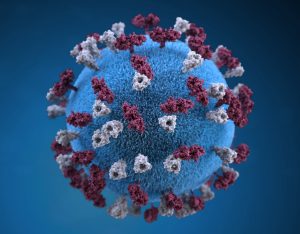Hunting for the molecular Achilles heel of Sars-CoV-2

HITS Researchers are collaborating on drug discovery against SARS-Cov-2, the virus that causes Covid-19 disease. Rebecca Wade and her group are using their tools for computer-aided drug discovery to target some of the virus proteins. This work is in part being done in the framework of the COVID-19 Grand Challenge.
How can researchers who work “in silico” help fight the Coronavirus with software tools? Members of the Molecular and Cellular Modeling (MCM) group at HITS are deploying methods that they have developed and applied against other diseases, such as neglected diseases caused by parasites and brain diseases: They have been working on developing tools and workflows for molecular simulation and drug design in the Human Brain Project (HBP) brain simulation platform. These methods were applied to investigate the effects of signaling molecules on molecular networks in the brain.
“While different strategies are required to tackle different diseases, many of the computational tools for studying proteins and for drug discovery that can, for example, be applied to fighting brain diseases can also be applied to viral diseases”, says MCM group leader Rebecca Wade. “Therefore, we decided to collaborate on drug discovery against SARS-Cov-2, the virus that causes Covid-19 disease.”
The HITS researchers are participating in the COVID-19 Grand Challenge. The first step of the challenge consists in using a set of different computational methods to provide a consensus list of lead compounds for at least 3 Covid-19 targets that are involved in viral entry or replication. “Together with our partners in Turin and Jülich we are employing some of the methods we have developed at HITS,” says Rebecca Wade. They use TRAPP (Transient Pockets in Proteins) for exploring the flexibility of protein binding sites and identifying druggable structures, and RASPD+ (Rapid Screening with Physicochemical Descriptors) for identifying molecules that might bind in a given protein binding site.
You can find more information on how HBP scientists and infrastructures help in the Corona crisis here.
About HITS
HITS, the Heidelberg Institute for Theoretical Studies, was established in 2010 by physicist and SAP co-founder Klaus Tschira (1940-2015) and the Klaus Tschira Foundation as a private, non-profit research institute. HITS conducts basic research in the natural, mathematical, and computer sciences. Major research directions include complex simulations across scales, making sense of data, and enabling science via computational research. Application areas range from molecular biology to astrophysics. An essential characteristic of the Institute is interdisciplinarity, implemented in numerous cross-group and cross-disciplinary projects. The base funding of HITS is provided by the Klaus Tschira Foundation.